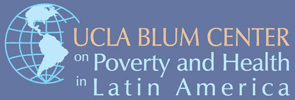Policy
With a focus on applying innovations in research and practice to the creation of sustainable actions, the UCLA Blum Center works with stakeholders across diverse sectors to identify and recommend effective policy interventions that improve health outcomes.
Fact Sheets: English ~ Spanish
Policy Research and Recommendations
Policy Research and Recommendations
Community Health Centers Play a Critical Role in Caring for the Remaining Uninsured in the Affordable Care Act Era, October 26, 2016
Steven P. Wallace, PhD, Maria-Elena Young, MPH, Michael A. Rodriguez, MD, MPH , Amy Bonilla, Nadereh Pourat, PhD
Federally Qualified Health Centers —commonly referred to as Community Health Centers (CHCs)—serve as a safety net for people who did not gain health insurance under the Affordable Care Act (ACA), including those immigrants not eligible for Medicaid or health insurance exchange coverage. ACA-driven changes in health insurance coverage, funding, and related policy have created new challenges for these safety net organizations.
This policy brief reports the findings from analyses of the U.S. HRSA Uniform Data System and interviews conducted in 2014-16 with the leadership of 31 CHCs. The CHCs were in communities with high concentrations of immigrants and uninsured residents, in states that either expanded Medicaid (California and New York) or that chose not to expand it (Georgia and Texas). The study found that most CHCs now see more patients, including significant numbers without insurance. The ACA has brought new resources to CHCs but has also reinforced challenges, including the need for stable revenue streams, sufficient staffing support, and assistance in leveraging new reimbursement mechanisms. Policy recommendations to address these challenges include continuing core federal funding, insuring the remaining uninsured, addressing workforce challenges, and preparing CHCs for alternative payment mechanisms.
View or download complete report.
Creating Conditions to Support Healthy People: State Policies that Affect the Health of Undocumented Immigrants and their Families, 2015
Michael Rodriguez, MD,MPH, Steven P. Wallace, PhD, Maria-Elena Young
This report identifies a range of inclusive and exclusive state policies that directly or indirectly impact the health of undocumented immigrants. Readers will find a framework for assessing the level of inclusion of state policies and will also find recommendations on how to change policies to improve the ability of undocumented workers and their families to have healthy lives.
View or download complete report.
Health Insurance for Undocumented Immigrants: Opportunities and Barriers on the Mexico Side of the US Border
Int J Health Plann Mgmt. 2012;27:50-62
Armando Arredondo, PhD; Emmauel Orozco, PhD; Steven P. Wallace, PhD; Michael Rodriguez, MD, MPH
This article identifies opportunities, barriers and challenges in Mexico's policy networks for the development of health care programs for undocumented migrants in the USA and their families.
Policy Initiatives
Latin American Health Equity Summit Preparations Commence
The Robert Wood Johnson Foundation: Latin American Health Equity Summit will bring together public health, health care, and social policy experts from around the world. During the three day summit the aim is to lay the groundwork to developing a roadmap offering a thoughtful, pragmatic approach for improving health equity throughout the Americas. Preparations for the summit are underway!
Migrant Children and Health
Every year, thousands of unaccompanied children from Mexico and Central America enter the United States. This high-profile issue in the media has given rise to the use of scaremongering tactics to build support for political agendas that push for tighter, more draconian immigration laws.
In 2014, the UCLA Blum Center, in collaboration with representatives from Duke University, the University of Washington, and members of the American Medical Association, American Academy of Pediatrics and the American Academy of Physicians formed the Migrant Children Health Coalition to bring national attention to the conditions facing migrating children from Central America. The mission of Migrant Children and Health is to correct the misconceptions regarding the public health implications of child migrants in the United States. The coalition's efforts work toward reducing the stigma and health disparities faced by child migrants.
To get involved in this advocacy campaign, visit the Migrant Children and Health website.
Research and Policy Committee of the UC Blum Federation
The UCLA Blum Center serves as the coordinating body along with UC Santa Cruz and UC Riverside to identify shared research and policy interests among the 10 UC Blum Centers. Find more information here.
CBRE Shared Advantage Plan
The UCLA Blum Center's team completed its research on promoting healthy communities through the Shared Advantage Plan, literature review findings and Healthy Communities Report inform systemwide policies throughout CBRE business lines in the CBRE Report. Our recommendations for approaches, measurements, and evaluation tools have been translated into the Shared Advantage policies on best ways to conduct business while keeping the community and individual health as a priority in all transactions. Read the report!


